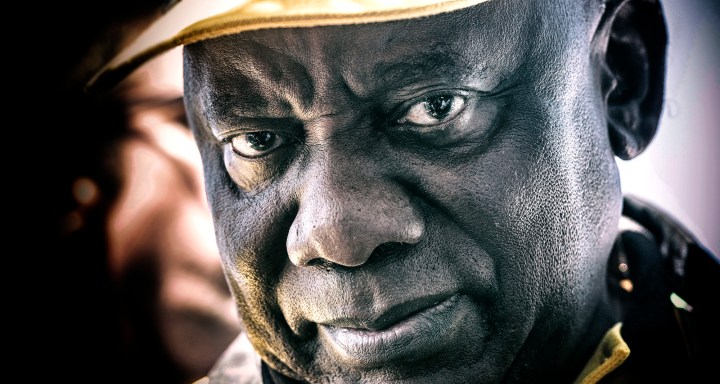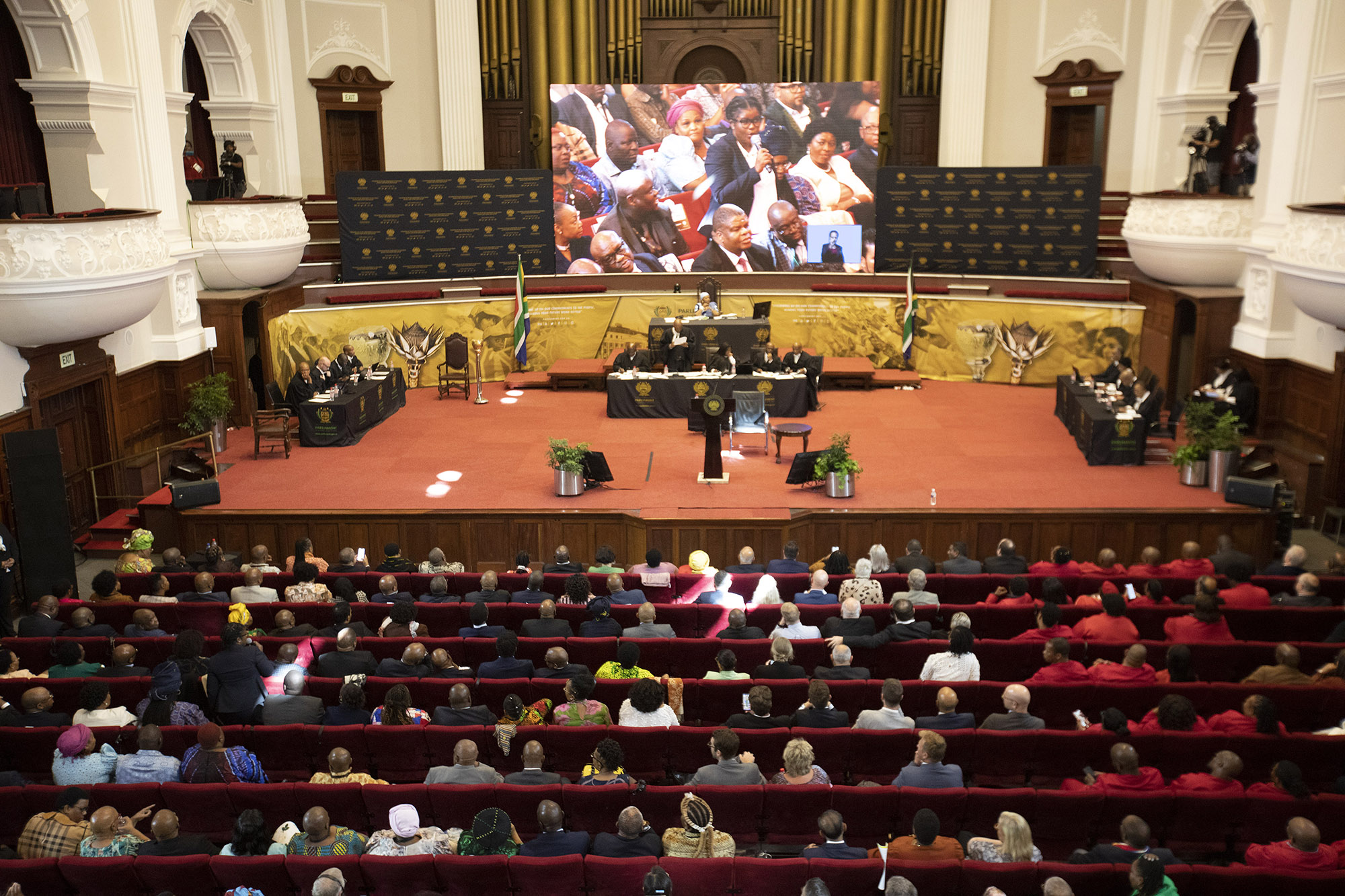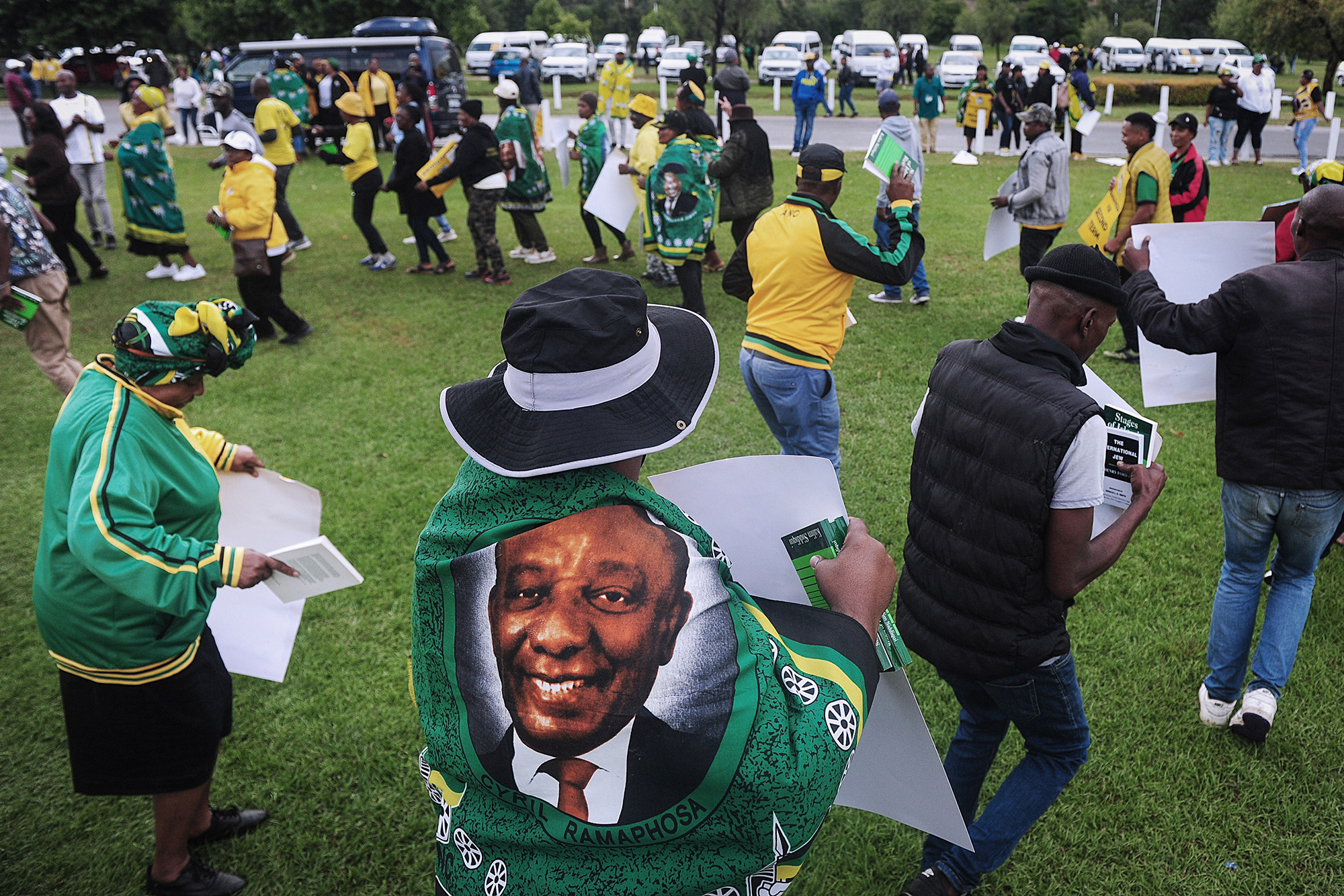ANALYSIS
Phala Phala, Parliament, Eskom: Ruling party is closing ranks again, playing ANC vs Everyone Else

ANC elective years are, by the governing party’s own admission, disruptive – even outside party ranks. Amid chatter of slates, deals and cash for votes, few in government are prepared to stick out their heads and take firm decisions on South Africa’s governance and political economy.
ANC strategic and tactical home truths include that no one but the ANC will remove a president, and when coming under attack or even criticism – perceived or real – close ranks and stall, stall, stall until the noise goes away. Not being seen to be acting amid criticism or public pressure is a pillar of strategy and tactics.
It bought Mathole Motshekga another six months as ANC chief whip after speculation of his exit when, at the 2012 Mangaung elective conference, he failed to make it back to the national executive committee (NEC), a requirement for the parliamentary post.
When, in mid-June 2013, then ANC secretary-general Gwede Mantashe arrived in Parliament to publicly announce the parliamentary shuffle, that point – waiting for speculation to blow over before acting – was made.
It worked for former president Jacob Zuma who, in 2007, rose to party president under the cloud of arms deal corruption, and left the country’s presidency in February 2018, having survived the Nkandla saga, but ultimately not the #GuptaLeaks and State Capture revelations.
Zuma survived some eight motions of no confidence, including the August 2017 secret ballot vote, but resigned late on Valentine’s Day 2018 after a hot political week that saw the unprecedented postponement of the State of the Nation Address and opening of Parliament.
Read more in Daily Maverick: “Analysis: Jacob Zuma’s exit, a political hyper-drama”
That was the ANC Cyril Ramaphosa joined as deputy president on Zuma’s slate at the 2012 Mangaung elective conference. At the time, word was that Zuma, already overshadowed by scandal, needed a person of integrity as his deputy. Then incumbent deputy Kgalema Motlanthe’s challenge for the president’s post – late, lukewarm, but “on principle” – flopped, a signal of how much of leadership remains slate politics.
For almost five years, Ramaphosa served as deputy to Zuma also in government, telling the State Capture commission chairperson Chief Justice Raymond Zondo that he made the move in order to fight from within the system.
As deputy president, he could have done more, the State Capture commission report ultimately found.
“The natural conclusion is that, during this period, the most dominant political faction – the ANC under president Zuma – permitted, supported and enabled corruption and State Capture.”
Ramaphosa was part of this, but in the bruising jockeying into the 2017 Nasrec conference, he styled himself as the clean break – renewal and unity for the ANC, and anti-corruption and rule of law for the government.
It was a very narrow win – 179 votes more than his rival associated with the continuation of South Africa’s status quo, the recently returned ex-African Union commission chairperson, Nkosazana Dlamini Zuma.
That hair’s breadth difference, and age-old ANC tactics and traditions, forced appeasement. Perhaps that approach also appealed to the negotiator in Ramaphosa, both as one-time trade unionist, ANC lead negotiator in ending apartheid and also in Constitution drafting. Or more recently as business millionaire and honcho, a role which seems to keep the business community loyal and placated.

Cape Town City Hall during the debate of the Section 89 Independent Panel Report on 13 December 2022. (Photo: Shelley Christians)
The Phala Phala farm forex theft saga changed much since it emerged in June 2022 over two years after the fact. As did the parliamentary Section 89 independent panel report recommendation that Ramaphosa had a case for an impeachment inquiry to answer over serious violations of the Constitution, like outside paid work and conflicts of interest, all of which are dismissed by Ramaphosa, who’s also taken the report on review to the Constitutional Court.
Read more in Daily Maverick: “Phala Phala report – no good options for President Ramaphosa or our country”
While his spin doctors and supporters explain away presidentially contemplated resignation because he was a constitutionalist and advocate for the rule of law – that’s also his statement to the Section 89 independent assessment panel – history holds a different turn.
Visit Daily Maverick’s home page for more news, analysis and investigations
In 1994 it became clear that Thabo Mbeki would be Nelson Mandela’s deputy president, not Ramaphosa, the ANC secretary-general and lead in the ANC team that negotiated apartheid’s end with that regime.
And while Ramaphosa went on to become chief negotiator in the Constitution-making process, when that was done in April 1996, he left to make his millions in business, through investment leveraged against the newly legislated empowerment redress, and prestigious directorships.
No one sought to persuade him differently then. Mbeki’s hold in the fractious ANC was firm; the so-called exiles, who returned from 1990, had a firm grasp on the “inziles” – those who’d organised in public to fight apartheid police, clampdowns and brutality in the streets, workplaces and places of worship across South Africa.
That exile control brought with it an institutional culture of suspicion, need to know and covert money and goods channels, which helped shape the governing party.
That, in November 2022, Ramaphosa would be persuaded to not resign, is a sign of not only different political times in the ANC that’s governed for 28 years, but also in South Africa.
The group who’s understood to have moved to keep the president in place, centred on trusted allies in government – ministers Gwede Mantashe, Mondli Gungubele, Enoch Godongwana and Eastern Cape premier Oscar Mabuyane – and the presidential special advisor Bejani Chauke, without whom Ramaphosa seldom makes a move, according to some, and who now is also nominated for ANC treasurer-general.
Mantashe then ensured the ANC NEC, where support for Ramaphosa has been fluid, “decided” that the governing party’s deployees in Parliament would vote against the Section 89 independent panel report to kill off any parliamentary impeachment proceedings.
Some of those NEC dynamics have now emerged – Dlamini Zuma explained her decision to buck the party line and support an impeachment inquiry on broadcaster Newzroom Afrika – how that NEC was cut short prematurely in a manner “alien” to the ANC where discussions must unfold fully, even if up to 4am. Her “yes” vote was not support for impeachment, but for an inquiry.
Read more in Daily Maverick: “Impeachment proceedings against Ramaphosa quashed as few rebels voted ‘yes’ and his loudest critics were nowhere to be seen“
The president’s men – and it really seems to have been just men who talked publicly – sought to spin that nothing untoward had happened in the ANC NEC. In the same spin control, they leaked the president’s statement to the Section 89 independent panel, denying wrongdoing, even while Parliament had not yet publicly released the report it had commissioned in terms of the impeachment inquiry rules.
That is a glimpse into the machinery lined up behind Ramaphosa. The rough and ready trade-offs, promises and assurances made for the ANC NEC to hold the line for ANC MPs to vote down that Phala Phala Section 89 independent panel impeachment recommendation report will come back to bite.
Effectively, developments over these 10 days in December have made Ramaphosa beholden to vested interests. But they may also have emboldened the president to reshuffle his Cabinet to remove several ministers kept to keep the peace amid the various contending factions in the governing party, and those like Dlamini Zuma and Tourism Minister Lindiwe Sisulu, who have openly defied him.

A supporter of Cyril Ramaphosa, South Africa’s president, wears a flag bearing his image outside a gathering of ANC leaders in Johannesburg, South Africa, on 5 December 2022. (Photo: Leon Sadiki / Bloomberg via Getty Images)
And maybe complete that reorganisation of the state he pledged in February 2018 on being elected president. What has happened instead is a concentration of power in the Presidency – from infrastructure, state-owned enterprises, climate change and a just energy transition policy and investment, employment stimulus and cutting red tape to coordination with premiers and mayors and intelligence.
Read more in Daily Maverick: “The (not) super DG as Presidency broadens reach across civil service”
It has assisted, for example, in overriding minerals and energy minister Mantashe over the threshold for embedded power generation – to 100MW in June 2021, rather than the possible 10MW under consideration.
Read more in Daily Maverick: “Increase to 100MW embedded generation threshold will give ‘oomph’ to South African economy, says Ramaphosa”
But it’s a chicken and egg scenario whether the concentration of powers in the Presidency facilitates or blocks.
In the controlled optics of the Ramaphosa presidency, consulting, social compacting and khumbaya appeals to unite in solidarity across society are central themes. As are inter-ministerial task teams ostensibly to get Cabinet ministers to work together, though this seems to be at best stalling, and at worst, failing.
But Cabinet processes – from approving draft legislation for submission to Parliament, appointments or key policy decisions – can take up to six months to go through, or even longer. Sometimes getting the presidential nod can take weeks, if not a couple of months. This holds up governance, further complicated as no one will move in what’s effectively become an imperial presidency.
The pattern, set at the top, is replicated throughout ministries and departments. The public service stalls, even if relief is offered by some lekker PR moments like opening a new school or a new factory.
Eskom is a case in point.
After weeks of sharp criticism from within the ANC, also in its recent NECs – as rotational power cuts are identified as a key election risk – but also from government ministers like Mantashe, who said rotational power cuts were aimed at overthrowing government, Eskom CEO André de Ruyter resigned on 14 December.
He had received little if any public backing from his political and organisational bosses, Public Enterprises Minister Pravin Gordhan and the power utility’s board.
The money and the stable supply line of diesel needed to keep rotational power cuts at a lower stage, promised in the last round of Stage 6 rolling outages, never materialised. And as it was known would happen, after 15 days the 50 million litres of diesel ran out. Then, just a ministerial appeal to the board to ensure Stage 6 ends.
Read more in Daily Maverick: “Found: Fifty million litres of diesel for fifteen days of relief – but source of funding future supplies remains uncertain”
Examples of such governance fudginess, including a complex whirl of government and governing ANC interests, could also include land reform, rail transport or water, and more.
Still, the controlled optics of the Ramaphosa presidency focus on resilience in tough times – “We are a people of optimism, even as we brace against harsh winds,” he wrote in Monday’s newsletter – and the so-called green shoots.
Most recently, that included economic growth up by 1.6% in the third quarter of 2022 on the back of agriculture, finance, transport and manufacturing, according to Statistics SA.
“The size of the economy now exceeds pre-pandemic levels.”
Joblessness over the same period dropped to 43.1% on the expanded definition that includes those too disheartened to even look for work. That’s 204,000 more jobs created, according to Stats SA.
But even amid the Presidency’s tightly controlled optics and definitively glass-half-full attitude, it’s apparent not all’s going according to plan. Not in party, not in government.
A week in politics is a long time, and so is a five-day ANC national elective conference where deals are being discussed, ditched and reengineered to the last second.
But expectations are that Ramaphosa will clinch a second term as party president. He may not get the top six he’d like, and definitely not the ANC NEC where nominations indicate a full range of factional and vested interests of all sorts often thrown together under the broad banner of radical economic transformation.
The take-out? The noisy focus on personality driven contestations for governing ANC internal party positions has offered a distraction that’s welcomed in some circles. But it leaves South Africa’s political economy fundamentals fragile and fraught.
It’s back to the future. DM




















 Become an Insider
Become an Insider
He does not have an unfettered right to appoint and dismiss Cabinet Ministers. It would depend on the top six and configuration of the NEC. Otherwise, he will have a second term that comes from hell in the NEC including threats to recall him. I think when people write these issues they need to have a clear understanding that he must take into consideration the balance of forces in the NEC and balance these with the interests of the country. He cannot say that it is his last term otherwise by June next year he would find himself kicked out. The ease with which people speak and those with no constituency in the ANC has become very reckless. If he wanted to act he should have done so in his first term and create a legacy for himself. The ANC is on the verge of implosion a very careful act is needed whilst being resolute. Deferring issues to the next NEC is not a light matter because hell would break loose at the Conference.